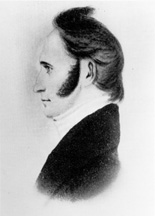Alexander O. Anderson
| Alexander Outlaw Anderson | |
|---|---|
 |
|
|
United States Senator from Tennessee |
|
|
In office February 26, 1840 – March 4, 1841 |
|
| Preceded by | Hugh Lawson White |
| Succeeded by | Spencer Jarnagin |
| Personal details | |
| Born |
November 10, 1794 Jefferson County, Tennessee (now Hamblen County, Tennessee) |
| Died | May 23, 1869 (aged 74) Knoxville, Tennessee |
| Political party | Democratic |
| Profession | Politician, Lawyer, Judge |
Alexander Outlaw Anderson (November 10, 1794 – May 23, 1869) was an American attorney who represented Tennessee in the United States Senate, and later served in the California State Senate, and on the California Supreme Court.
The son of longtime U.S. Senator Joseph Anderson, he was born at his father's home, "Soldier's Rest", in Jefferson County (now Hamblen County),Tennessee. He was named for his grandfather, frontiersman Alexander Outlaw (1738–1826).
As a youth he graduated from Washington College near Greeneville, Tennessee. He volunteered for service in the War of 1812 and fought under Andrew Jackson in the Battle of New Orleans in 1815. Later that year he was admitted to the bar and began a practice in Dandridge, Tennessee. Afterwards he moved to Knoxville, and then served as the superintendent of the United States Land Office in Alabama in 1836. He was an agent in the Indian removals of 1838 for Alabama and Florida.
He was elected to the United States Senate by the Tennessee General Assembly to the vacancy caused by the resignation of Senator Hugh Lawson White, a member of the Whig party whose resignation was orchestrated by Governor James K. Polk so that a Democratic senator could be appointed. Anderson served in that body from February 26, 1840, to March 4, 1841, when the term expired. Anderson did not stand for reelection to the seat; it was to remain vacant for a period when a group of Tennessee Democratic legislators called the "Immortal Thirteen" refused to meet and give a qurorum sufficient to allow the election of a successor, apparently preferring no representation to that by a member of the other party, the Whigs.
...
Wikipedia
